Photovoltaics & Concentrated solar power (CSP) - Project examples
-
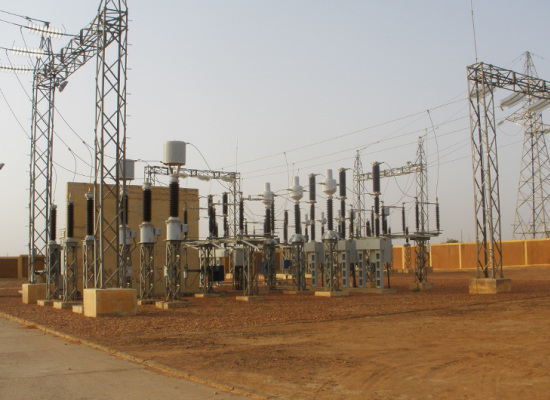
Mauritania - Solar Energy-Based Rural Electrification in the Aftout Elchargui Region
The Mauritanian Government initiated a national strategy to provide universal access to basic services (water, energy, telecommunication) in rural and suburban areas. In this context, the Government received a loan from the Islamic Development Bank and the OPEC Fund for International Development (OFID) for the implementation of strategic investments in electricity infrastructure, one of the components being consultancy services for project supervision. The project includes mainly:
- the procurement and installation of (i) one solar PV plant with an estimated capacity of 2.6 MWc and storage, (ii) a diesel back-up system to complement the electricity production (2 diesel gensets), and the optimisation of the envisaged electricity production as per the prevailing conditions
- the construction of approx. 270 km of HV transmission networks and approx. 60 km of LV distribution networks as well as approx. 6,000 consumer connections
intec's services
Mission 1: Detailed technical studies, including environmental and social impact studies for the equipment which is divided into 3 lots (power plants and their optimisation, HV networks, LV networks): Elaboration of preliminary design and detailed design for the chosen options, including technical specifications and dimensioning, engineering, functional specifications for the equipment, soil investigations, topography, BoQ etc., and elaboration of tender documents.
Mission 2: Support to the Employer during tendering: Site visits with the Bidders, reply to Bidders' queries, bid evaluation and support to the Employer during contract negotiations for the EPC contracts.
Mission 3: Technical control and supervision of works: Management of the implementation works, scheduling and steering of site works, and assistance during acceptance operations.
Client
Agence de Promotion de l'Accès Universel aux Services (APAUS)Financing
Islamic Development Bank (IDB)Period of implementation
2016 - 2018 -
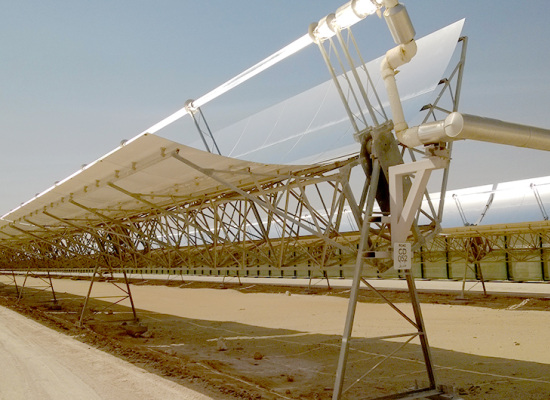
Libya - Strategic Plan for Renewable Energy Development
The situation of the electricity sector in Libya needs proper and rapid improvement, and the energy generation is mainly based on conventional energies burning heavy or light oil or gas fuel with a total installed generation capacity of around 9,000 MW mainly located in the shores north of the country. The use of renewable energies would allow Libya to cope with the increasing demand resulting from reconstruction of infrastructure destroyed during the last years and use oil & gas products to earn revenues for the country. The objective of this assignment is to develop a strategic plan for renewable energy development in the country.
intec's services
Stage I: Energy mix and renewable resource assessment
- development of a least cost expansion plan and renewable energy scenarios
Stage II: Strategic plan for development of renewable energy:
- analysis of institutional mechanism, procedures and processes for selection and licensing of RE projects
- develop a road map for RE and grid development until 2030 and estimate the size of investments required. The grid development roadmap includes the requirements for balancing reserve and proposes necessary power systems control infrastructure.
- summary of opportunities and interfaces of different set-ups
Stage III: Framework for a pilot private sector participation transaction
- develop technical specifications for Private Sector Participation (PSP) in wind and solar energy
- developing a grid code document for connecting renewable energy projects
- identify candidates for renewable energy PSP transactions
- analysis of the financial viability of the suggested pilot transactions
- conduct a risk assessment for PSP
- market analysis to identify interest in potential pilot projects
Stage IV: Specialized training and experience sharing workshops
Client
World BankFinancing
World BankPeriod of implementation
01/2017-12/2017; 05-06/2018 -
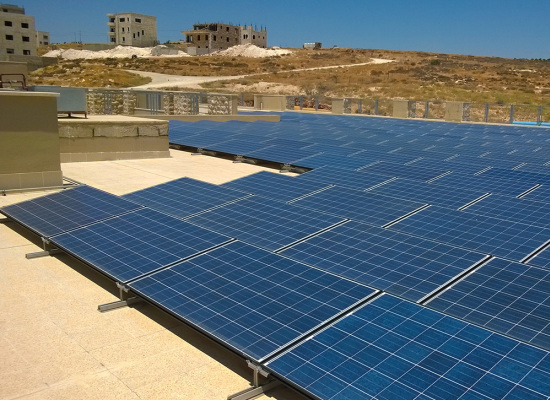
Jordan - Green Lending Programme in Jordan - Verification Consultant
AFD has designed a Green Lending Program aiming at scaling up investment by industry and service sectors in energy efficiency (EE), renewable energy (RE) and environmental performance. To this effect, the Green Lending program provides credits to Jordanian banks through the green credit facility, an investment grant scheme and financing of support frameworks for sustainable energy.
The monitoring and verification consultant, i.e. the present project, will ensure that the implemented investments meet the expectations, that all projects have been completed in accordance with the relevant investment plans and that they are on track to achieve the planned energy savings.
intec's services
Support to the implementation of a significant number of renewable energy and energy efficiency investments by:
checking the eligibility of projects
upon their completion checking the projects' compliance
recalculating the yield and business model of each PV project:
- car park systems of 5 kWp to 1 MWp
- roof-top systems of 25 kWp to 200 kWp
- green field systems of 500 kWp to 1 MWp
recalculating the efficiency of EE projects:
- assessment according to Jordanian Green Building Guideline
- certification according to LEED Gold Standard
(Sustainable sites, Water Efficiency, Energy and Atmosphere, indoor Environmental Quality, Materials and resources, Innovation in design)
monitoring and operational review of the projects
capitalizing the results of the program and ensure its visibility
Client
Agence Française de Développement (AFD)Financing
Agence Française de Développement (AFD)Period of implementation
23.5.2014 - 30.4.2018
Mauritania - Solar Energy-Based Rural Electrification in the Aftout Elchargui Region
The Mauritanian Government initiated a national strategy to provide universal access to basic services (water, energy, telecommunication) in rural and suburban areas. In this context, the Government received a loan from the Islamic Development Bank and the OPEC Fund for International Development (OFID) for the implementation of strategic investments in electricity infrastructure, one of the components being consultancy services for project supervision. The project includes mainly:
- the procurement and installation of (i) one solar PV plant with an estimated capacity of 2.6 MWc and storage, (ii) a diesel back-up system to complement the electricity production (2 diesel gensets), and the optimisation of the envisaged electricity production as per the prevailing conditions
- the construction of approx. 270 km of HV transmission networks and approx. 60 km of LV distribution networks as well as approx. 6,000 consumer connections
intec's services
Mission 1: Detailed technical studies, including environmental and social impact studies for the equipment which is divided into 3 lots (power plants and their optimisation, HV networks, LV networks): Elaboration of preliminary design and detailed design for the chosen options, including technical specifications and dimensioning, engineering, functional specifications for the equipment, soil investigations, topography, BoQ etc., and elaboration of tender documents.
Mission 2: Support to the Employer during tendering: Site visits with the Bidders, reply to Bidders' queries, bid evaluation and support to the Employer during contract negotiations for the EPC contracts.
Mission 3: Technical control and supervision of works: Management of the implementation works, scheduling and steering of site works, and assistance during acceptance operations.
Client
Agence de Promotion de l'Accès Universel aux Services (APAUS)Financing
Islamic Development Bank (IDB)Period of implementation
2016 - 2018Libya - Strategic Plan for Renewable Energy Development
The situation of the electricity sector in Libya needs proper and rapid improvement, and the energy generation is mainly based on conventional energies burning heavy or light oil or gas fuel with a total installed generation capacity of around 9,000 MW mainly located in the shores north of the country. The use of renewable energies would allow Libya to cope with the increasing demand resulting from reconstruction of infrastructure destroyed during the last years and use oil & gas products to earn revenues for the country. The objective of this assignment is to develop a strategic plan for renewable energy development in the country.
intec's services
Stage I: Energy mix and renewable resource assessment
- development of a least cost expansion plan and renewable energy scenarios
Stage II: Strategic plan for development of renewable energy:
- analysis of institutional mechanism, procedures and processes for selection and licensing of RE projects
- develop a road map for RE and grid development until 2030 and estimate the size of investments required. The grid development roadmap includes the requirements for balancing reserve and proposes necessary power systems control infrastructure.
- summary of opportunities and interfaces of different set-ups
Stage III: Framework for a pilot private sector participation transaction
- develop technical specifications for Private Sector Participation (PSP) in wind and solar energy
- developing a grid code document for connecting renewable energy projects
- identify candidates for renewable energy PSP transactions
- analysis of the financial viability of the suggested pilot transactions
- conduct a risk assessment for PSP
- market analysis to identify interest in potential pilot projects
Stage IV: Specialized training and experience sharing workshops
Client
World BankFinancing
World BankPeriod of implementation
01/2017-12/2017; 05-06/2018Jordan - Green Lending Programme in Jordan - Verification Consultant
AFD has designed a Green Lending Program aiming at scaling up investment by industry and service sectors in energy efficiency (EE), renewable energy (RE) and environmental performance. To this effect, the Green Lending program provides credits to Jordanian banks through the green credit facility, an investment grant scheme and financing of support frameworks for sustainable energy.
The monitoring and verification consultant, i.e. the present project, will ensure that the implemented investments meet the expectations, that all projects have been completed in accordance with the relevant investment plans and that they are on track to achieve the planned energy savings.
intec's services
Support to the implementation of a significant number of renewable energy and energy efficiency investments by:
checking the eligibility of projects
upon their completion checking the projects' compliance
recalculating the yield and business model of each PV project:
- car park systems of 5 kWp to 1 MWp
- roof-top systems of 25 kWp to 200 kWp
- green field systems of 500 kWp to 1 MWp
recalculating the efficiency of EE projects:
- assessment according to Jordanian Green Building Guideline
- certification according to LEED Gold Standard
(Sustainable sites, Water Efficiency, Energy and Atmosphere, indoor Environmental Quality, Materials and resources, Innovation in design)
monitoring and operational review of the projects
capitalizing the results of the program and ensure its visibility
Client
Agence Française de Développement (AFD)Financing
Agence Française de Développement (AFD)Period of implementation
23.5.2014 - 30.4.2018-
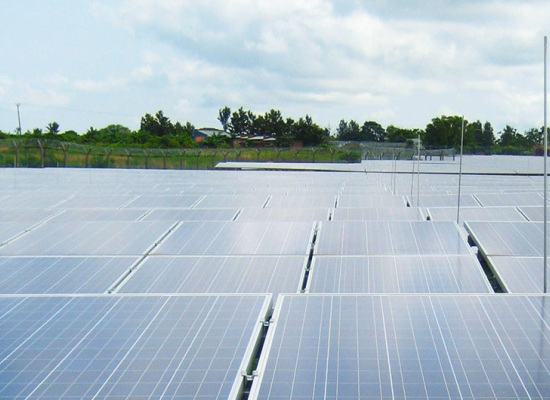
Uganda - 10 MW PV Solar Project in Soroti District
The Netherlands Development Finance Company (FMO) invests into a 10 MW PV solar power project to be developed, owned and operated by the company Access Uganda Solar Limited. FMO contracted the services of a consultant to carry out lenders' technical, environmental and social due diligence of the project, construction supervision and monitoring of operational performance.
intec's services
Due Diligence Phase
- Project site assessment: topography, solar resource and ambient conditions; logistics; etc.
- Review of technology and plant design
- Review of energy yield analysis and forecasts for expected power production in kWh
- Review of project contracts / agreements (i.a. PPA, interconnection, O&M, water supply & land agreements)
- Review of construction and completion testing, of off-take structure (PPA) and of O&M structure
- Electrical interconnection review
- Check and follow-up of permits and licenses
- Review of expected project costs and of financial model assumptions
- Review of the project's environmental and social impact assessment (ESIA) process and report
- Summary of recommendations and proposed actions in a draft environmental and social action plan (ESAP)
Construction and Commissioning Phase
- Construction monitoring and quality assurance
- Design review and approval
- Review of acceptance testing procedures and test witnessing
- Participation in commissioning and taking-over
Operational Phase (services on call until 2032)
- Monitoring of punch list items, review of operational performance, periodical review of operation reports
Client
Netherlands Development Finance Company ("FMO")Financing
Access Uganda Solar LimitedPeriod of implementation
20/03/2015 – 31/03/2018 -
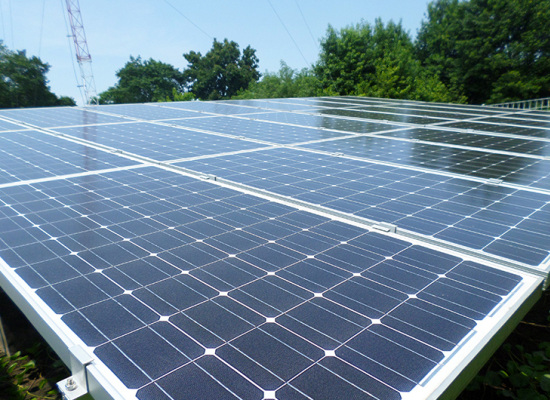
Côte d'Ivoire - Installation of Photovoltaic Generators in Abidjan
The "New Deal for Energy in Africa", launched by the African Development Bank, aims to make energy universally accessible by 2025. A progressive shift to low-carbon energy systems including renewable energies is planned in order to guarantee a green growth. The possibility of installing photovoltaic generators on the bank's site is explored within the framework of the introduction of renewable energy systems.
The Consultant's role is to perform the feasibility study for the installation of solar panels on the bank´s building and to prepare the technical methodology for the procurement of such works.
intec's services
The mission's objective for the Consultant is to evaluate the feasibility for the construction of photovoltaic generators both in technical and administrative terms:
- Site analysis (visit the identified zones and electrical installations of the bank's building, identification of the shaded areas, evaluation of technical and architectural constraints, etc.);
- Identification of administrative and regulatory constraints (possibility to obtain a building permit, cross public streets, connection of PV generators to the electricity grid, regulatory constraints, etc.);
- Sizing of high performance photovoltaic cells, adapted for the sites and setting of balances of power;
- Sizing of the bearing structures and of all the elements needed for the connection to the electricity grid or for off-grid operation of the PV generators;
- Cost estimate of all the works including the annual operating and maintenance costs for the installations;
- Elaboration of tender specifications;
- Drafting the final report of the study phase;
- Supervision of works and procurement;
- Drafting of the project's final report.
Client
African Development BankFinancing
African Development BankPeriod of implementation
15.11.2017 - 15.03.2018 -
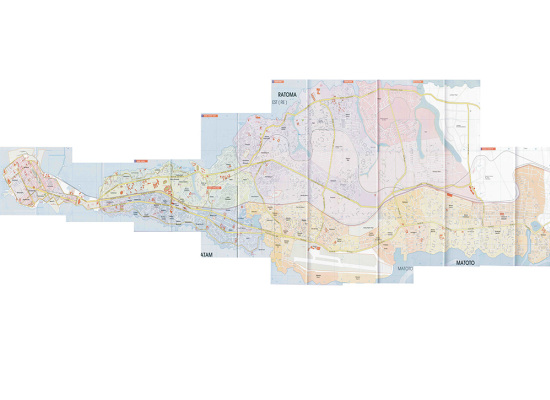
Guinea - Analysis of Electricity Supply solutions in the region of Boke
MASDAR is developing various projects in the Caribbean and other regions of the world and sourced experts to support the engineering and project management team. These support tasks are contracted separately in the form of so-called Work Orders (WO).
The Guinea Alumina Company (GAC) currently plans to extract about 15 million tons bauxite per year and to install approximately 30 MW of power capacity. The government and other key stakeholders are keen to develop power supply solutions for both the mining sector and the civil / private sector. In light of this, the present study defines the demand and potential power supply options for mining activities and for the surrounding communities.
The overall objectives of this assignment were to:
- Prepare a demand study on the power requirements for the short, medium and long term in the regions impacted by GAC´s activities.
- Develop options, incorporating both renewable energy and existing (and new) fossil fuel based generation for meeting the determined power requirements.
intec's services
- Data collation and initial analyses (initially desktop focused)
- Site visits and meetings with key stakeholders
- Tour and inspection of available facilities
- Development of project concept and options
- Feasibility report, incorporating demand study outcomes
Client
Abu Dhabi Future Energy Company - MASDARFinancing
Abu Dhabi Future Energy Company - MASDARPeriod of implementation
10/2017 - 01/2018
Uganda - 10 MW PV Solar Project in Soroti District
The Netherlands Development Finance Company (FMO) invests into a 10 MW PV solar power project to be developed, owned and operated by the company Access Uganda Solar Limited. FMO contracted the services of a consultant to carry out lenders' technical, environmental and social due diligence of the project, construction supervision and monitoring of operational performance.
intec's services
Due Diligence Phase
- Project site assessment: topography, solar resource and ambient conditions; logistics; etc.
- Review of technology and plant design
- Review of energy yield analysis and forecasts for expected power production in kWh
- Review of project contracts / agreements (i.a. PPA, interconnection, O&M, water supply & land agreements)
- Review of construction and completion testing, of off-take structure (PPA) and of O&M structure
- Electrical interconnection review
- Check and follow-up of permits and licenses
- Review of expected project costs and of financial model assumptions
- Review of the project's environmental and social impact assessment (ESIA) process and report
- Summary of recommendations and proposed actions in a draft environmental and social action plan (ESAP)
Construction and Commissioning Phase
- Construction monitoring and quality assurance
- Design review and approval
- Review of acceptance testing procedures and test witnessing
- Participation in commissioning and taking-over
Operational Phase (services on call until 2032)
- Monitoring of punch list items, review of operational performance, periodical review of operation reports
Client
Netherlands Development Finance Company ("FMO")Financing
Access Uganda Solar LimitedPeriod of implementation
20/03/2015 – 31/03/2018Côte d'Ivoire - Installation of Photovoltaic Generators in Abidjan
The "New Deal for Energy in Africa", launched by the African Development Bank, aims to make energy universally accessible by 2025. A progressive shift to low-carbon energy systems including renewable energies is planned in order to guarantee a green growth. The possibility of installing photovoltaic generators on the bank's site is explored within the framework of the introduction of renewable energy systems.
The Consultant's role is to perform the feasibility study for the installation of solar panels on the bank´s building and to prepare the technical methodology for the procurement of such works.
intec's services
The mission's objective for the Consultant is to evaluate the feasibility for the construction of photovoltaic generators both in technical and administrative terms:
- Site analysis (visit the identified zones and electrical installations of the bank's building, identification of the shaded areas, evaluation of technical and architectural constraints, etc.);
- Identification of administrative and regulatory constraints (possibility to obtain a building permit, cross public streets, connection of PV generators to the electricity grid, regulatory constraints, etc.);
- Sizing of high performance photovoltaic cells, adapted for the sites and setting of balances of power;
- Sizing of the bearing structures and of all the elements needed for the connection to the electricity grid or for off-grid operation of the PV generators;
- Cost estimate of all the works including the annual operating and maintenance costs for the installations;
- Elaboration of tender specifications;
- Drafting the final report of the study phase;
- Supervision of works and procurement;
- Drafting of the project's final report.
Client
African Development BankFinancing
African Development BankPeriod of implementation
15.11.2017 - 15.03.2018Guinea - Analysis of Electricity Supply solutions in the region of Boke
MASDAR is developing various projects in the Caribbean and other regions of the world and sourced experts to support the engineering and project management team. These support tasks are contracted separately in the form of so-called Work Orders (WO).
The Guinea Alumina Company (GAC) currently plans to extract about 15 million tons bauxite per year and to install approximately 30 MW of power capacity. The government and other key stakeholders are keen to develop power supply solutions for both the mining sector and the civil / private sector. In light of this, the present study defines the demand and potential power supply options for mining activities and for the surrounding communities.
The overall objectives of this assignment were to:
- Prepare a demand study on the power requirements for the short, medium and long term in the regions impacted by GAC´s activities.
- Develop options, incorporating both renewable energy and existing (and new) fossil fuel based generation for meeting the determined power requirements.
intec's services
- Data collation and initial analyses (initially desktop focused)
- Site visits and meetings with key stakeholders
- Tour and inspection of available facilities
- Development of project concept and options
- Feasibility report, incorporating demand study outcomes
Client
Abu Dhabi Future Energy Company - MASDARFinancing
Abu Dhabi Future Energy Company - MASDARPeriod of implementation
10/2017 - 01/2018-
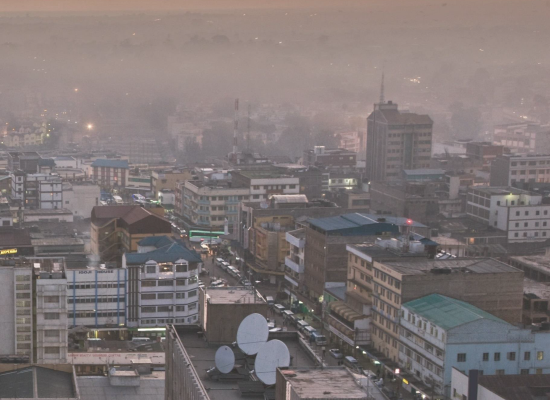
Sierra Leone - Power Sector Roadmap and Coordination Activity
The Power Sector Roadmap and Coordination Activity is one of the components of the Electricity Sector Reform Project of the Sierra Leone Threshold Programme funded by the US Government through the Millennium Challenge Corporation. The Project objective is to support the Government’s efforts in the energy sector as well as advance the power sector reform agenda currently under implementation, and improve the effectiveness and viability of service provision through proper coordination.
The outcomes of this assignment will include the following modules:
Module 1: Define a Sector Roadmap and an Action Plan to Support the Power Sector Reform Process
Module 2: Support the development of a Power Sector Financial Framework
Module 3: Power Sector Reform Action Plan and Advisory Support
Module 4: Private Power Solicitation Framework
intec's services
Module 1: Define Sector Roadmap and Action Plan to Support Power Sector Reform Process
- Map existing power sector roles and responsibilities and perform a gap analysis
- Develop power sector reform roadmap
- Develop action plan for implementation of power sector roadmap
Module 2: Power Sector Financial Framework
- Support start-up of power sector collections account
- Develop power sector financial sustainability plan
Module 4: Develop a Private Power Solicitation Framework (with main focus on solar IPP)
- Process for the solicitation of IPPs
- Elaboration of contractual documents (implementation agreement including concessions and incentives, power purchase agreement (PPA), distribution and transmission agreement, land lease, generation license, and application for relevant environmental clearances)
- Develop a comprehensive IPP framework, defining of roles and responsibilities of the local public stakeholders
- Training in IPP framework
Client
The Government of Sierra LeoneFinancing
Millennium Challenge Corporation (MCC)Period of implementation
01.2017 – 11.2017 -
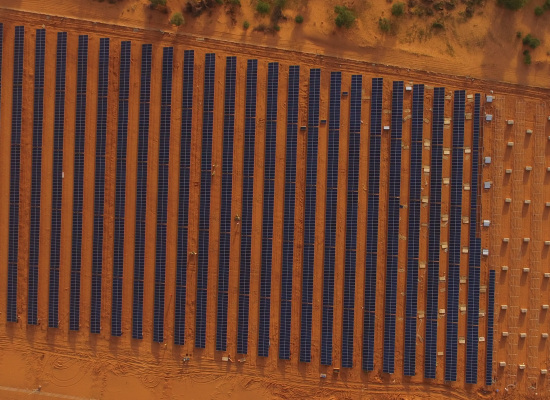
Mauritania - Construction of Solar Hybrid Systems with 16.6 MW Solar Capacity
MASDAR is developing various small and large-scale solar and wind projects in the Pacific and other regions of the world and sourced a pool of experts to support the engineering and project management team. These support tasks are contracted separately in the form of so-called Work Orders (WO). They include feasibility studies, conceptual designs, preparation of tender documents, evaluation of bids and on- and off-site project management.
Under the current work order, all together eight hybrid systems in the range up to several MW per site and with at total solar capacity of 16.6 MW (range from 1 to 3.4 MW) will be implemented under an EPC approach. Each power plant consists of solar PV, controller, and diesel generator.
intec's services
- Tasks of the "owner's representative", including coordination between the Mauritanian Electricity Company and the EPC contractor
- Design review
- Review of project execution plan
- Inspection of project construction works including QA and QC;
- Review of payment milestones
- Inspection of works' progress
- QHSE audit on all sites and submission of related report
Client
Abu Dhabi Future Energy Company PJSC - MASDARFinancing
MASDARPeriod of implementation
01.2016 - 06.2017 -
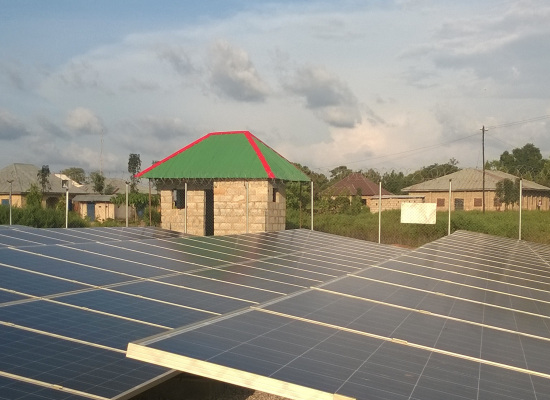
Nigeria - Grid-Connected Solar Power Plant (Feasibility Study & Pre-Feasibility Studies)
In its Roadmap for Power Sector Reforms (2013), Nigeria has articulated its commitment to accelerate economic growth while reducing its GHG emissions, i.a. by introducing renewables to the energy mix. The present project shall contribute to this goal. It includes the following main tasks:
- an in-depth feasibility study including power system integration studies for the development of a 50 MW solar plant at a single site in the State of Bauchi, allowing for modular scale-up and phased development, intended to lead to an investment bid;
- a pre-feasibility study on possible cogeneration feeder plants (20-50 MW) adjacent to existing and upcoming hydropower plants (e.g. Shiro-ro, Jebba, Kainji), grid-connected, centralized and/or distributed, in-tended to lead to functional bids;
- a pre-feasibility study on possible embedded generation plants within privatised DISCOs, grid-connected or distributed, intended to lead to functional bids;
- the preparation of tender documents for EPC;
- a training and capacity building programme.
intec's services
For all three studies, the scope of work includes i.a.:
- site identification and screening
- determination of solar resource
- selection of two best-ranked sites on the basis of technical-economic analyses
- investigation of grid integration and topographical issues
- preparation of an environmental and social management framework
- development of an investment plan
- elaboration of technical concept for the PV plant and the interconnection to the grid
- sensitivity analyses, commercial considerations
- determination of optimum plant sizes and potential for future expansion
- selection of highest-ranked sites and preparation of concept note and design, preliminary topographical survey and geotechnical investigation
In addition, the in-depth feasibility study for the investment bid includes the following services:
- preparation of concept design, drawings, cost estimate and implementation schedule
- comparison of off-take options (bulk trader or sale to DISCO) and feasibility of interconnection policies
- environmental scoping for the selected sites and preparation of ToR for a full ESIA
- preparation of complete tender documents for EPC
- preparation of a deployment and a marketing plan
The pre-feasibility scoping studies have the following additional deliverables:
- investor profiling and ranking, investment and development timelines
- preparation of business plans
- configuration and specification of respective projects and their justification, identification of key milestones, activities, potential partners, etc.
- indicative options for possible ownership and financing (third-party PPA, owner-operated, hybrid financing, capital lease arrangements, etc.)
The project also includes an extensive training, capacity building and dissemination programme, which includes inter alia:
- Seminars and workshops in Abuja on
PV technology, PV project planning in the Nigerian context
Economic and financial analysis of PV power plants
PV power plant basic design, technical specifications, tender documents and ESIA- A one-week study tour to Germany: visits to large-scale PV power plants, research facilities, a regional dispatch centre, a manufacturer of PV modules, project developers, EPC Contractors, etc.
- On-the-job training along all project activities.
Client
Federal Ministry of the Environment, Nigeria Erosion and Watershed Management Project (NEWMAP)Financing
World BankPeriod of implementation
03.2015 - 03.2017
Sierra Leone - Power Sector Roadmap and Coordination Activity
The Power Sector Roadmap and Coordination Activity is one of the components of the Electricity Sector Reform Project of the Sierra Leone Threshold Programme funded by the US Government through the Millennium Challenge Corporation. The Project objective is to support the Government’s efforts in the energy sector as well as advance the power sector reform agenda currently under implementation, and improve the effectiveness and viability of service provision through proper coordination.
The outcomes of this assignment will include the following modules:
Module 1: Define a Sector Roadmap and an Action Plan to Support the Power Sector Reform Process
Module 2: Support the development of a Power Sector Financial Framework
Module 3: Power Sector Reform Action Plan and Advisory Support
Module 4: Private Power Solicitation Framework
intec's services
Module 1: Define Sector Roadmap and Action Plan to Support Power Sector Reform Process
- Map existing power sector roles and responsibilities and perform a gap analysis
- Develop power sector reform roadmap
- Develop action plan for implementation of power sector roadmap
Module 2: Power Sector Financial Framework
- Support start-up of power sector collections account
- Develop power sector financial sustainability plan
Module 4: Develop a Private Power Solicitation Framework (with main focus on solar IPP)
- Process for the solicitation of IPPs
- Elaboration of contractual documents (implementation agreement including concessions and incentives, power purchase agreement (PPA), distribution and transmission agreement, land lease, generation license, and application for relevant environmental clearances)
- Develop a comprehensive IPP framework, defining of roles and responsibilities of the local public stakeholders
- Training in IPP framework
Client
The Government of Sierra LeoneFinancing
Millennium Challenge Corporation (MCC)Period of implementation
01.2017 – 11.2017Mauritania - Construction of Solar Hybrid Systems with 16.6 MW Solar Capacity
MASDAR is developing various small and large-scale solar and wind projects in the Pacific and other regions of the world and sourced a pool of experts to support the engineering and project management team. These support tasks are contracted separately in the form of so-called Work Orders (WO). They include feasibility studies, conceptual designs, preparation of tender documents, evaluation of bids and on- and off-site project management.
Under the current work order, all together eight hybrid systems in the range up to several MW per site and with at total solar capacity of 16.6 MW (range from 1 to 3.4 MW) will be implemented under an EPC approach. Each power plant consists of solar PV, controller, and diesel generator.
intec's services
- Tasks of the "owner's representative", including coordination between the Mauritanian Electricity Company and the EPC contractor
- Design review
- Review of project execution plan
- Inspection of project construction works including QA and QC;
- Review of payment milestones
- Inspection of works' progress
- QHSE audit on all sites and submission of related report
Client
Abu Dhabi Future Energy Company PJSC - MASDARFinancing
MASDARPeriod of implementation
01.2016 - 06.2017Nigeria - Grid-Connected Solar Power Plant (Feasibility Study & Pre-Feasibility Studies)
In its Roadmap for Power Sector Reforms (2013), Nigeria has articulated its commitment to accelerate economic growth while reducing its GHG emissions, i.a. by introducing renewables to the energy mix. The present project shall contribute to this goal. It includes the following main tasks:
- an in-depth feasibility study including power system integration studies for the development of a 50 MW solar plant at a single site in the State of Bauchi, allowing for modular scale-up and phased development, intended to lead to an investment bid;
- a pre-feasibility study on possible cogeneration feeder plants (20-50 MW) adjacent to existing and upcoming hydropower plants (e.g. Shiro-ro, Jebba, Kainji), grid-connected, centralized and/or distributed, in-tended to lead to functional bids;
- a pre-feasibility study on possible embedded generation plants within privatised DISCOs, grid-connected or distributed, intended to lead to functional bids;
- the preparation of tender documents for EPC;
- a training and capacity building programme.
intec's services
For all three studies, the scope of work includes i.a.:
- site identification and screening
- determination of solar resource
- selection of two best-ranked sites on the basis of technical-economic analyses
- investigation of grid integration and topographical issues
- preparation of an environmental and social management framework
- development of an investment plan
- elaboration of technical concept for the PV plant and the interconnection to the grid
- sensitivity analyses, commercial considerations
- determination of optimum plant sizes and potential for future expansion
- selection of highest-ranked sites and preparation of concept note and design, preliminary topographical survey and geotechnical investigation
In addition, the in-depth feasibility study for the investment bid includes the following services:
- preparation of concept design, drawings, cost estimate and implementation schedule
- comparison of off-take options (bulk trader or sale to DISCO) and feasibility of interconnection policies
- environmental scoping for the selected sites and preparation of ToR for a full ESIA
- preparation of complete tender documents for EPC
- preparation of a deployment and a marketing plan
The pre-feasibility scoping studies have the following additional deliverables:
- investor profiling and ranking, investment and development timelines
- preparation of business plans
- configuration and specification of respective projects and their justification, identification of key milestones, activities, potential partners, etc.
- indicative options for possible ownership and financing (third-party PPA, owner-operated, hybrid financing, capital lease arrangements, etc.)
The project also includes an extensive training, capacity building and dissemination programme, which includes inter alia:
- Seminars and workshops in Abuja on
PV technology, PV project planning in the Nigerian context
Economic and financial analysis of PV power plants
PV power plant basic design, technical specifications, tender documents and ESIA
- A one-week study tour to Germany: visits to large-scale PV power plants, research facilities, a regional dispatch centre, a manufacturer of PV modules, project developers, EPC Contractors, etc.
- On-the-job training along all project activities.






